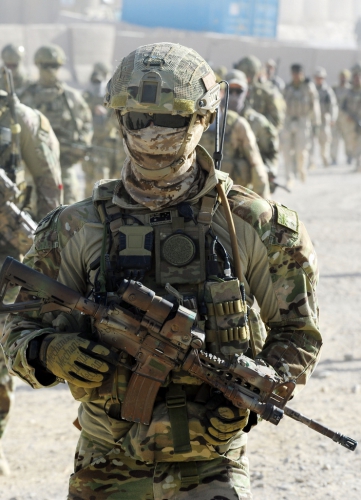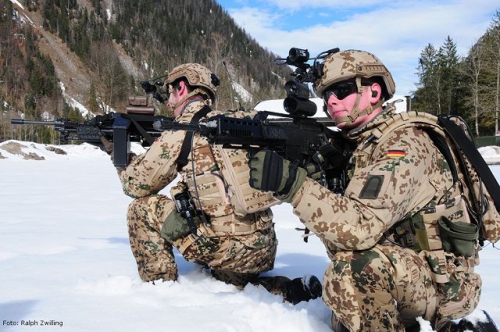The modern era is characterized by the steady, at times exponential, growth in the material power of human societies in mastering their world. This has paradoxical consequences in the field of war. The most obvious is an exponential increase in warring states’ means of destruction: nation-states can conscript entire societies, economies, and propaganda apparatuses towards the war effort (“total war”), geographical limits to war are annihilated (aerial bombing), and destructive power becomes god-like (nuclear war). This accounts for the crescendo of violence in the wars of the modern era, beginning with the French Revolutionary and Napoleonic Wars, but especially with the world wars and the happily unrealized apocalyptic destructive potential of the Cold War.
Another trend, however, has been a relative decline in war. This has been partly due to the trend just mentioned: war between advanced states has become so destructive that their leaders have increasingly avoided direct military confrontation (the famous Cold War doctrine of “Mutually Assured Destruction”).
Another reason has been the declining utility of military conquest in the modern era. In a world of trade and advanced technology, military occupation of backward lands is less and less profitable to a modern state. Furthermore, as modern traits spread to occupied territories (literacy, hi-tech communications, development, etc.), their peoples acquire self-consciousness and thus the means to throw off a foreign colonist. Hence, in the post-war era, the European colonial empires were gradually dismantled and in general were not replaced with equivalent forms of direct rule.
Carl von Clausewitz’s On War [2] stresses the tendency of modern war to dialectically rise to ever-greater “extremes” of violence. The Prussian theorist also identified a moderating factor, however, which I believe had powerful ramifications for the future of modern warfare:
The wants of an army can be divided into two classes, first those which every cultivated country can furnish; and next those which can only be obtained from those localities where they are produced. The first are chiefly provisions, the second the means of keeping an army complete in every way. The first can therefore be obtained in the enemy’s country; the second, as a rule, can only be furnished by our own country, for example men, arms, and almost all munitions of war. Although there are exceptions to this classification in certain cases, still they are few and trifling and the distinction we have drawn is of standing importance, and proves again that the communication with our own country is indispensable.[1]
As the technology on which military power depends becomes more advanced, so territorial occupation (unless the residents can be made productive loyal citizens) becomes less useful.

All this adds up to the declining utility of military occupation in the modern era. There are limits to this, however: Western European states have, with the loss of their colonial empires, become economically insecure due to their dependence on unstable Middle-Eastern sources of energy. This in turn has meant political dependence on the United States of America and the Gulf Arab states.
Modernity both enabled the Western conquest of the world and gave the colored nations means to throw off imperial rule. The creation of separate nation-states, giving each distinct people its own homeland and polity wherever possible, has led to a decrease in violence. States have, as outlined above, far less incentive to conquer one another than in the past: the costs of war are too great, the benefits of military occupation too few. Inevitable power asymmetries remain, but overt empires – perhaps the most common pre-modern form of government – are rare.
The wars of recent years have tended to be those within states, that is to say between tribal, ethnic, and religious groups within societies, with varying degrees of inevitable involvement by foreign powers. As Western nations lose their ethno-cultural homogeneity and cohesion, the likelihood of ethnic civil war increases – particularly when some severe economic, environmental, or geopolitical crisis inevitably intervenes. The West has largely been spared war since 1945. The rationales for war between states are fewer. This in no way justifies the foolish and irresponsible liberal, Panglossian view that war is therefore abolished and that Westerners no longer need to think about defending their interests, let alone do anything about it.
War will continue to change with new technologies, often in ways which are difficult, if not, impossible to predict. Two examples, among many, of such potentially revolutionary developments: the use of drone bombing and the proliferation of weapons of mass destruction, possibly used by stateless terrorist groups.
I believe precautionary measures are warranted. Westerners are massively declining, both as a share of the global population and of the population within their own nations. French demographic decline in the nineteenth century led to a reversal: where previously France had dominated German politics, for the first time Germany had the serious possibility of dominating not just French politics, but indeed that of the entire European continent. Serbian demographic decline within Kosovo has led to the indefinite loss of their ancestral homeland, leading to the rule of Muslim Kosovar terrorists and gangsters. The rise of China and the fertility of the African, Islamic, and Mestizo worlds may augur similar fates for the West as a whole. Responsible men of the West ought to work to make their societies as antifragile [3] and war-proof as possible, developing policies which will prevent both civil war and foreign domination.
Note
1. Carl von Clausewitz (trans. J. J. Graham & F. N. Maude), On War (Ware, England: Wordsworth Editions, 1997), Book 5, Chapter 15, p. 273.





 del.icio.us
del.icio.us
 Digg
Digg
Les commentaires sont fermés.